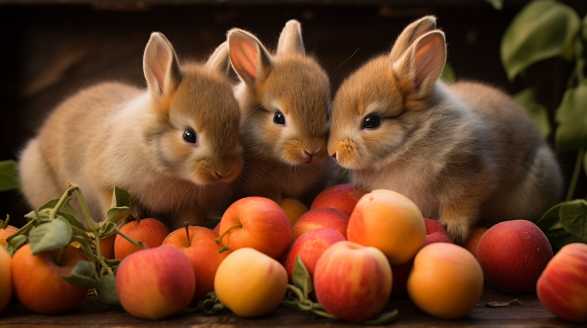Introduction
Can Rabbits eat peaches? Let’s find out…
You might be thinking, “What on earth do peaches and rabbits have in common?” Well, my curious friend, prepare to be blown away as we uncover the mysterious link between these seemingly unrelated things. We’re about to learn the secrets behind peaches and their impact on the immune system, dental health, digestion, hydration, allergies, and so much more in our precious furry companions.
Imagine fluffy tails twitching with anticipation as we explore the power of peaches in boosting a rabbit’s immunity and fostering a robust immune response. Hold onto your carrot treats as we unveil the surprising connection between peaches and maintaining healthy pearly whites.
It’s like a fruity paradise for our fluffy friends!
So, get ready for an adventure that will leave you hopping with excitement. Whether you’re a bunny parent, a peach enthusiast, or simply a curious soul, this journey is bound to leave you captivated and craving more knowledge.
Let’s dive into this peachy rabbit extravaganza together!
**Many People Avoid Peaches For Their Rabbits
** Do not Feed Rabbits Peach Seeds!
**Do Not Give Any Food To Your Rabbit Without Consulting A Veterinarian
Key Takeaways
- Peaches can provide nutritional benefits to rabbits, including vitamins, fiber, and hydration.
- Introduce peaches gradually and monitor your rabbit for any adverse reactions.
- Offer fresh, ripe peaches in small portions, removing the pit.
- Moderation is key when feeding peaches to rabbits, as excessive sugar intake can cause digestive issues and weight gain.
- Pay attention to serving size, with approximately 1 tablespoon of mashed peaches or 1-2 peach slices as the ideal portion for adult rabbits.
- Wash peaches thoroughly and consider choosing organic options.
- Observe your rabbit’s individual response to peaches and discontinue if any discomfort or adverse reactions occur.
- Keep a varied treat menu for your rabbit, including fresh greens, crunchy veggies, and other fruits like berries.
Peaches as a Safe Treat for Rabbits: Dos and Don’ts
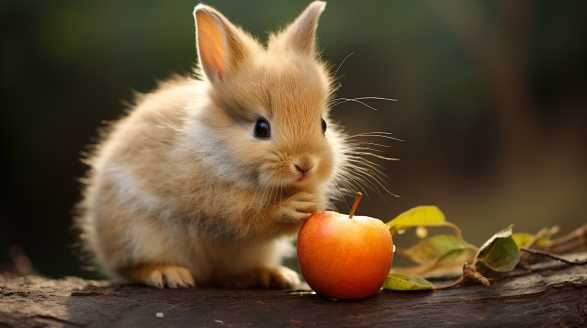
As a rabbit owner, I always strive to provide my furry friend with the best care possible. Part of that care includes giving my rabbit occasional treats to keep them happy and entertained.
However, before you go ahead and offer your rabbit this delicious treat, there are a few dos and don’ts to consider. I’ll share all the important information about feeding peaches to rabbits.
Are Peaches Safe for Rabbits?
Yes, peaches are generally safe for rabbits to eat. They contain essential nutrients like vitamin C, vitamin A, fiber, and water, which can be beneficial for your rabbit’s overall health.
Excessive sugar intake can lead to digestive issues, dental problems, and weight gain in rabbits.
Dos:
- Introduce gradually: Start by offering a small piece of ripe peach and monitor your rabbit’s reaction. If there are no adverse effects, such as diarrhea or bloating, you can gradually increase the amount over time.
- Choose organic peaches: Whenever possible, opt for organic peaches to reduce the risk of pesticide exposure. Remember to wash them thoroughly before serving to your rabbit.
- Offer fresh, ripe peaches: Ripe peaches are softer and easier for rabbits to chew and digest. Avoid giving your rabbit unripe or overripe peaches, as they may cause digestive upset.
- Remove the pit: Always remove the peach pit before offering it to your rabbit. Peach pits contain cyanide and can be harmful or even fatal if ingested.
- Consider the size: Cut the peach into small, bite-sized pieces to make it easier for your rabbit to nibble on without choking. Remember, rabbits have small mouths, so large chunks can pose a choking hazard.
- Monitor for adverse effects: Pay close attention to your rabbit’s behavior and stool after offering peaches. If you notice any negative reactions, such as diarrhea or discomfort, discontinue feeding peaches immediately and consult your veterinarian.
Don’ts:
- Don’t overfeed: Though peaches can be a tasty treat, it’s important not to overdo it. Limit your rabbit’s peach intake to a few small pieces per week. Too many peaches can upset their delicate digestive system.
- Avoid canned peaches: Canned peaches often contain added sugars, preservatives, and even artificial sweeteners, all of which are harmful to rabbits. Stick to fresh peaches to ensure your rabbit’s health and safety.
- Never give unripe or moldy peaches: Unripe peaches are hard to digest and may cause discomfort or digestive issues. Similarly, moldy peaches can be toxic to rabbits and should be avoided at all costs.
- No peach leaves, twigs, or branches: While the actual peach fruit is safe, other parts of the plant, such as leaves, twigs, and branches, can be toxic to rabbits. Only offer the flesh of the peach to your furry friend.
- Don’t ignore allergies: Just like humans, rabbits can have allergies too. If you suspect your rabbit may be allergic to peaches, watch out for symptoms such as itching, sneezing, or breathing difficulties. If these signs occur, avoid giving peaches to your rabbit in the future.
So, can rabbits eat peaches? Absolutely!
Offer fresh, ripe peaches in moderation, remove the pit, and be observant of any adverse reactions. By responsibly incorporating peaches into your rabbit’s diet, you can provide a tasty and nutritious treat that they’ll love.
The Link between Peaches and Rabbit Immune System Support
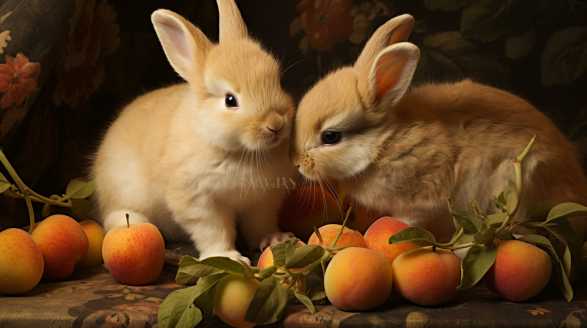
Hey there, fellow rabbit lovers! Today, I want to talk to you about something that might surprise you – the incredible connection between peaches and the immune system support of our fluffy friends.
Peaches and rabbits? How does that work?” Well, hang on tight because I’m about to reveal the fascinating link between these two seemingly unrelated things.
The Power of Peaches
Peaches are not only deliciously sweet and juicy, but they also harbor a multitude of health benefits. Packed with essential vitamins and minerals, these fuzzy fruits are a nutritional powerhouse.
Now, let’s explore how this relates to our beloved rabbits.
Understanding the Rabbit’s Immune System
Before we can fully grasp the connection between peaches and the immune system of rabbits, it’s important to have a basic understanding of how their immune system works. These adorable little creatures have a delicate immune system that helps protect them from various diseases and infections.
The rabbit immune system primarily consists of three main components:
- Innate Immunity – This is the bunny’s first line of defense and includes physical barriers like fur and skin, as well as certain immune cells that quickly respond to pathogens.
- Cellular Immunity – Rabbits have white blood cells called lymphocytes that play a crucial role in recognizing and eliminating foreign substances.
- Humoral Immunity – This component involves the production of antibodies by B cells, which help in neutralizing harmful pathogens.
Now that we have a basic understanding of the rabbit immune system, let’s explore the connection between peaches and its support.
How Peaches Boost Rabbit Immune System
1. Vitamin C – A Vital Nutrient
One of the main reasons peaches can be beneficial for our furry friends is their high vitamin C content. Vitamin C is essential for the synthesis of collagen, a protein that helps maintain healthy skin, blood vessels, and other connective tissues.
2. Antioxidant Powerhouse
Peaches contain a wide range of antioxidants such as vitamin A, vitamin C, and beta-carotene. These antioxidants play a vital role in protecting the immune system from oxidative stress caused by free radicals.
3. Fiber for Digestive Health
A healthy digestive system is closely linked to a robust immune system. Peaches are a good source of dietary fiber, which promotes optimal gut health.
4. Hydration is Key
Proper hydration is crucial for overall health and a strong immune system, even in rabbits. Peaches have a high water content, which makes them an excellent choice to help keep your bunny hydrated.
How to Incorporate Peaches into Your Rabbit’s Diet
Now that you’re aware of the fantastic benefits peaches can offer to your rabbit’s immune system, you might be wondering how to safely include them in their diet. Here are a few tips to get you started:
1. Introduce Peaches Gradually
As with any new food, it’s important to introduce peaches gradually into your rabbit’s diet. Start by offering a small slice and observe how your furry friend reacts.
2. Picking the Perfect Peach
When selecting peaches for your rabbit, it’s crucial to choose ripe ones that are free from mold or visible damage. Wash them thoroughly to remove any potential pesticides or contaminants before offering them to your bunny as a treat.
3. Moderation is Key
While peaches can be a healthy addition to your rabbit’s diet, it’s essential to remember that they should be given in moderation. Too many peaches can lead to digestive upset or an imbalance in their diet.
Who would have thought that these luscious fruits could have such a positive impact on our bunny’s immune system? By incorporating peaches into your rabbit’s diet in a safe and controlled manner, you can provide them with some essential vitamins, antioxidants, and hydration to promote a healthier and stronger immune system.
They’ll be hopping with joy and thanking you with their vibrant health!
Peaches and Rabbit Allergies: Identifying Potential Risks
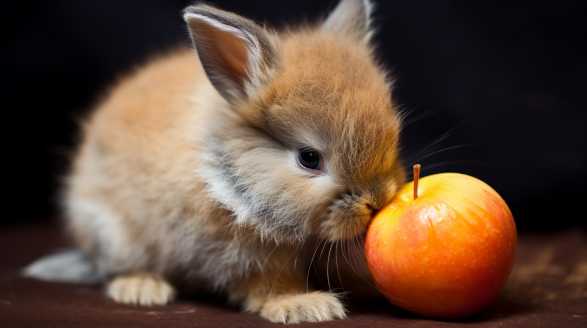
Hello there, fellow pet lovers! Have you ever wondered if your furry friend could be allergic to certain fruits and vegetables?
Yes, you heard it right – rabbits and their potential sensitivities to these juicy, fuzzy fruits. So, grab a seat, buckle up, and let’s explore this intriguing subject together!
Understanding Rabbit Allergies
Rabbits, like humans, can develop allergies to various substances, including certain foods. While rabbits are mostly herbivorous creatures, munching on fresh greens and hay, it’s essential to be aware of any potential allergens that might cause adverse reactions in our precious furry companions.
The Mystery of Peaches
Ah, peaches! Those delightful fruits that make our taste buds dance with joy.
Let’s find out!
- Sniff, Sniff! – Rabbits have a keen sense of smell, and certain aromas can either attract or repel them. Sniffing a peach might not be as enjoyable for your rabbit as it is for you. They may display signs of discomfort, such as sneezing or avoiding the scent.
- The Skin Test – Peaches have slightly fuzzy skin, and some rabbits may find that texture irritating. If your bunny shows signs of skin irritation, redness, or itching after coming into contact with a peach, it’s likely they have developed an allergic reaction.
- To Eat or Not to Eat? – While rabbits generally enjoy a wide range of fruits and vegetables, you should be cautious when introducing peaches into their diet. Some rabbits may experience digestive upset, loose stools, or even more severe symptoms like difficulty breathing after consuming peaches.
Symptoms of Rabbit Allergies
Now that we’ve covered the potential risks associated with peaches and rabbits, let’s take a closer look at the tell-tale signs that your furry friend might be allergic to these tempting fruits.
- Sneezing and Runny Nose – If your rabbit starts sneezing excessively or develops a runny nose shortly after being exposed to peaches, it could be a sign of an allergic reaction.
- Itchy Skin – If you notice your rabbit excessively scratching or nibbling at their skin after encountering peaches, this may indicate an allergic response.
- Digestive Issues – Allergies can also manifest in the digestive system. If your rabbit experiences diarrhea, bloating, or discomfort after eating peaches, it’s essential to suspect an allergy.
Allergies or Preference?
It is important to note that not all rabbits will necessarily have allergies to peaches. Individual sensitivities can vary, just like in humans.
What to Do if Your Rabbit is Allergic
If you suspect your rabbit may be allergic to peaches, it is essential to consult with a veterinarian who specializes in small animals. They can help identify and confirm the allergy, as well as provide guidance on appropriate diet adjustments and potential alternative treats.
Alternative Treats for Rabbits
Worried that your rabbit may be missing out on fruity treats due to their allergy? Fear not, for there are plenty of alternatives to explore!
- Carrots – An all-time favorite among rabbits, these crunchy orange wonders are packed with nutrients and are usually well-tolerated by our furry friends.
- Strawberries – These sweet, tangy berries are often a hit with rabbits, but be sure to offer them in moderation due to their sugar content.
- Apples – Crunchy and refreshing, apples make a fantastic treat for rabbits, but remember to remove the seeds and core before letting your bunny indulge.
- Blueberries – Bursting with antioxidants, these tiny berries can provide a tasty and healthful alternative to peaches.
Remember, snacking should always be monitored and limited to ensure a balanced diet for rabbits.
Well, folks, there you have it – the perplexing world of peaches and rabbit allergies. It’s important to be attentive to your rabbit’s reactions and to seek guidance from professionals if needed.
So, let’s keep our rabbits happy, healthy, and allergy-free on their extraordinary herbivorous adventures!
Peaches and Rabbit Dental Health: What You Need to Know
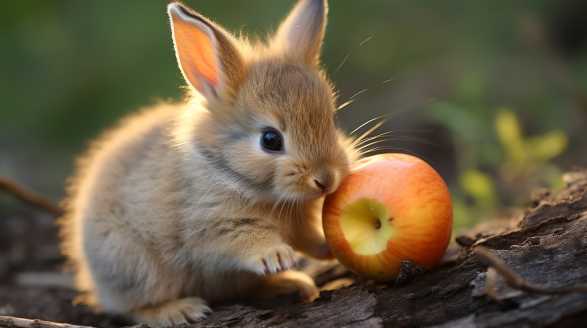
As a proud owner of a pet rabbit and an avid lover of peaches, I couldn’t help but wonder about the impact of these juicy fruits on my furry friend’s dental health. After researching extensively, I discovered some interesting facts that every rabbit owner should know.
The Importance of Dental Health for Rabbits
Before we look into the relationship between peaches and rabbit dental health, let’s understand why dental health is crucial for these adorable creatures. Rabbits have constantly growing teeth, and a healthy dental system keeps their teeth in check.
Proper dental care prevents issues like overgrown teeth, malocclusion (misalignment), and dental diseases. Neglecting their dental needs can lead to pain, difficulty eating, and even facial abscesses.
Rabbit Dental Anatomy 101
To understand how peaches influence rabbit dental health, let’s first explore their unique dental anatomy. Rabbits possess two sets of teeth – the incisors and the molars.
Incisors
Placed at the front of the mouth, rabbits’ incisors are used for grooming and nibbling on fruits and vegetables. These four prominent teeth are quick to grow, with the old ones being pushed out by new ones.
Molars
Deeper inside the mouth lie the molars, which are responsible for grinding and chewing hay and fibrous food. Rabbits have twelve molars in total, six on each side.
Diet and Rabbit Dental Health
Now that we’ve covered their dental anatomy, it’s time to discuss how diet affects rabbit dental health. Rabbits are herbivores, and their teeth have evolved to match their unique dietary requirements.
Fiber is Key!
The foundation of a healthy rabbit diet is high-fiber hay, such as timothy hay, which promotes regular chewing. The natural abrasiveness of hay helps wear down the constantly growing teeth, preventing overgrowth and dental issues.
Fresh Greens for Bunny Delight!
Adding a variety of fresh leafy greens to your rabbit’s diet not only provides essential nutrients but also encourages chewing, promoting dental health. Kale, parsley, and dandelion greens are wonderful options to consider.
Introducing Fruits, Like Peaches!
Ah, now we come to our beloved peaches in the equation. While fruits are a delightful treat, it’s important to offer them in moderation.
However, their high sugar content can be a concern if consumed excessively.
The Peachy Truth: How Peaches Affect Rabbit Dental Health
So, do rabbits and peaches make a perfect pair when it comes to dental health? Here’s what you need to know:
Chewing Benefits
Peaches, like many fruits, require a good amount of chewing. This chewing action promotes saliva production, which naturally helps rinse the rabbit’s mouth and teeth, preventing the buildup of harmful bacteria.
Moderation is the Key
While peaches offer some dental benefits, remember that rabbits have sensitive digestive systems. Too much sugar can disrupt their gut flora and potentially lead to GI stasis, a serious condition.
Pellets vs. Fruits
If your rabbit’s diet includes pelleted food, it’s crucial to remember that these typically contain all the necessary nutrients. Fruits like peaches should be seen as supplementary treats rather than a staple.
Caring for Your Rabbit’s Teeth
Now that we understand how peaches fit into the grand scheme of rabbit dental health, here are some general tips for maintaining your bunny’s pearly whites:
Dental Check-Ups
Regular visits to a rabbit-savvy veterinarian are essential for preventive dental care. A professional can identify any dental issues early on and provide appropriate treatment if needed.
Environmental Enrichment
Provide your rabbit with plenty of chew toys and objects to gnaw on. Things like untreated wood blocks, willow balls, and apple branches offer great opportunities for dental exercise.
Grooming and Supervision
While rabbits are excellent self-groomers, keeping an eye on their dental health is still essential. Observe their eating habits, check for signs of discomfort, and monitor the length of their incisors.
In this toothsome journey, we’ve explored the crucial relationship between peaches and rabbit dental health. Remember, a balanced diet, including plenty of high-fiber hay and leafy greens, is essential.
By prioritizing regular veterinary check-ups, providing environmental enrichment, and keeping a watchful eye on their dental health, you’ll ensure your beloved bunny hops through life with a beaming, healthy smile. So, go ahead, enjoy your peaches with newfound knowledge and the satisfaction of keeping your bunny’s chompers in tip-top shape!
Exploring the Digestive System of Rabbits: Can They Handle Peaches?
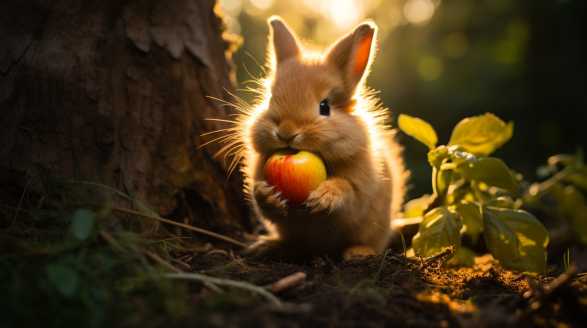
As I sat in my backyard, observing my pet rabbits nibbling on grass and hopping around playfully, a question popped into my mind: Can rabbits eat peaches? Curiosity got the best of me, and I embarked on a fascinating journey to explore the digestive system of rabbits and unravel the truth behind this fruity dilemma.
Understanding the Rabbit’s Digestive System
Rabbits are herbivores and possess a unique digestive system perfectly adapted for a plant-based diet. To break down the fibrous plant material they consume, rabbits undergo a two-step process called hindgut fermentation.
The First Step: The Mouth
When a rabbit takes a bite, it begins the digestive process in its mouth. The strong teeth of a rabbit help them efficiently chew and grind their food, which is essential in breaking down the physical structure of fibrous plant material.
The Second Step: The Stomach
Next stop on our digestive journey is the rabbit’s stomach. Contrary to popular belief, the stomach of a rabbit doesn’t play a significant role in the digestion of food.
The True Digestive Powerhouse: The Large Intestine
Now, let’s dive deep into the most critical part of a rabbit’s digestive system – the large intestine. This is where the magic happens, and crucial nutrients are extracted from the plant material.
Part 1: The Foregut Fermentation Section
Within the large intestine, rabbits possess a specialized compartment known as the cecum. This structure acts as a fermentation vat, housing billions of beneficial bacteria and microorganisms that aid in the breakdown of fibrous plant material.
Part 2: The Hindgut Fermentation Section
As fibrous material travels through the rabbit’s digestive system, the hindgut fermentation takes place. This is where the majority of nutrient absorption occurs.
Can Rabbits Handle Peaches?
Finally, let’s answer the burning question: can rabbits handle peaches? While rabbits can consume a variety of fruits, including apples, strawberries, and melons, peaches should be approached with caution.
Rabbits have sensitive digestive systems, and sudden changes in their diet can cause digestive upset. Peaches contain high water content and sugar levels, which could potentially upset the delicate balance in a rabbit’s gut.
If you’re determined to feed your furry friend a peachy treat, it’s essential to do so in moderation. Start by offering a small piece and monitor your rabbit for any signs of gastrointestinal distress, such as loose stools or reduced appetite.
The Importance of a Balanced Diet
Now that we’ve settled the peaches debate let’s take a moment to emphasize the crucial role of a balanced diet in a rabbit’s overall well-being. While fruits can make a tasty occasional treat, the majority of a rabbit’s diet should consist of fresh hay, leafy greens, and high-quality pellets.
As I conclude my exploration of the digestive system of rabbits and their compatibility with peaches, I’m left in awe of these extraordinary creatures. Their unique digestive adaptations enable them to thrive on a plant-based diet, making them fascinating and resilient pets.
Remember to respect your rabbit’s delicate digestive system and provide them with a balanced diet. While peaches may not be the ideal choice for everyday snacking, a well-rounded and carefully monitored treat every once in a while can add a burst of excitement to your bunny’s life.
Peaches and Rabbit Hydration: A Surprising Connection
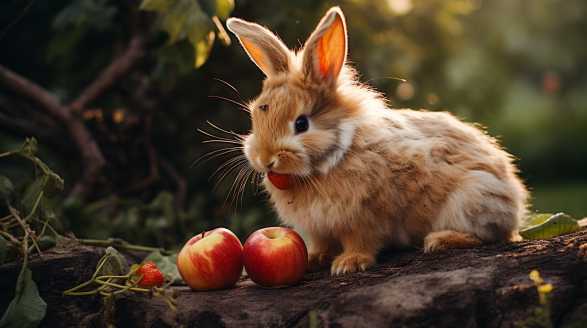
Have you ever wondered what the connection between peaches and rabbit hydration is? I, for one, was completely perplexed when I first stumbled upon this fascinating topic.
Prepare to be amazed as we look into the unexpected connection between peaches and rabbit hydration.
The Wonder of Peaches
Peaches have long been celebrated for their juicy, succulent flesh and delightful aroma. But did you know that these luscious fruits are also incredibly hydrating?
Peaches consist of a whopping 88% water content, making them an excellent choice for quenching your thirst.
But what does this have to do with rabbits, you may ask? Well, rabbits are sensitive creatures that require a high water intake to maintain their health and vitality.
Peaches are not only packed with water but also a myriad of essential nutrients that can benefit our furry friends.
The Rabbit’s Water Needs
Before we look into the surprising connection between peaches and rabbit hydration, let’s take a moment to understand the water needs of these adorable creatures. A rabbit’s body is about 60% water, and they require a constant supply to stay hydrated and maintain bodily functions like digestion and temperature regulation.
Unlike dogs and cats, rabbits cannot pant or sweat to cool themselves down. Instead, they rely on drinking water and consuming moisture-rich foods to stay hydrated.
The Peachy Solution
Now that we understand the importance of hydration for rabbits, it’s time to explore the surprising connection with peaches. Remember how we mentioned that peaches are loaded with water?
Introducing peaches into a rabbit’s diet can be a fun and delicious way to ensure they consume an adequate amount of water. Here are some reasons why peaches make an excellent addition to a rabbit’s hydration routine:
- High Water Content: As mentioned before, peaches are composed of 88% water, making them an attractive source of hydration for rabbits.
- Nutrient-Rich: Peaches are not only water-rich but also packed with vitamins A and C, as well as dietary fiber. These nutrients can support a rabbit’s overall well-being and digestive health.
- Low in Calories: It’s essential to monitor a rabbit’s calorie intake, as obesity can lead to various health problems. Fortunately, peaches are low in calories, making them an ideal hydrating snack without the worry of excess weight gain.
- Chewy Fun: Rabbits have a natural instinct to chew on things, and peaches provide a safe and enjoyable chewing experience. This can help satisfy their natural urge while also promoting dental health.
Feeding Peaches to Rabbits
Now that we know the benefits of peaches for rabbit hydration, it’s crucial to understand how to introduce this fruit into their diet correctly. Here are some guidelines to follow when feeding peaches to your furry friend:
- Quality Matters: Select ripe, organic peaches that are free from any pesticides or harmful chemicals. It’s essential to provide the best quality food for your rabbit’s well-being.
- Moderation is Key: While peaches offer numerous benefits, they should be fed in moderation. Too much fruit can upset a rabbit’s delicate digestive system. Aim to offer a few small slices of peach as a treat once or twice a week.
- Remove the Pit: Always remove the peach pit before offering the fruit to your rabbit. The pit itself can be a choking hazard, and the seeds contain trace amounts of a compound called amygdalin, which could be toxic in large quantities.
- Offer Variety: Peaches should be just one part of a balanced diet for your rabbit. Ensure they have access to fresh hay, a selection of dark leafy greens, and a limited amount of rabbit pellets to meet their nutritional needs.
Who would have thought that peaches and rabbit hydration could be so intricately connected? These juicy fruits provide not only hydration but also essential nutrients for our beloved furry companions.
So, the next time you bite into a luscious peach, remember the surprising connection it shares with our adorable rabbit friends. Cheers to peaches and the fascinating world of hydration!
Tips for Introducing Peaches to Your Rabbit’s Diet: A Step-by-Step Guide
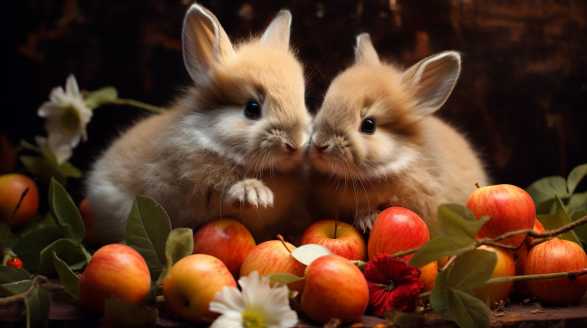
Hello there, fellow rabbit enthusiasts! If you’re reading this article, you must be as excited as I am about introducing peaches to your furry friend’s diet.
However, introducing new foods to our furry companions can be a little tricky. Worry not, as I’m here to guide you through the process step-by-step, ensuring a smooth transition for your rabbit.
Before diving headfirst into introducing peaches to your rabbit, it’s essential to understand why a gradual approach is necessary. Rabbits have sensitive digestive systems, and sudden dietary changes can lead to digestive upset or gastrointestinal issues.
2. Choose the Right Peaches
When it comes to introducing peaches to your rabbit’s diet, quality matters! Make sure to select fresh, ripe, and organic peaches that are free from pesticides and chemicals.
3. Preparing the Peaches
Now that you have the perfect peaches, it’s time to prepare them for your bunny. Follow these steps to ensure your rabbit’s safety and enjoyment:
- Wash the peaches thoroughly to remove any residues or dirt.
- Remove the pit, as it can be a choking hazard. Slice the peach into smaller pieces or simply mash it up.
- Avoid adding any sweeteners, such as sugar or honey, as rabbits do not require added sugars in their diet.
4. Start with Tiny Tastings
Patience is key when introducing new foods to your rabbit’s diet. Initially, offer your bunny a small piece of peach as a taste test.
If everything goes well, proceed to the next step.
5. Monitor Your Rabbit’s Response
Keep a close eye on your rabbit after they’ve had their first taste of peach. Look for any signs of digestive upset, such as diarrhea or bloating.
6. Gradually Increase the Amount
Assuming your rabbit enjoys the initial taste of peaches and displays no adverse reactions, you can slowly increase the amount. However, it’s crucial to remember that peaches should always be a treat and not a staple part of your rabbit’s diet.
7. Be Mindful of Portion Control
While peaches can be a delicious treat for your rabbit, moderation is key. Introducing peaches to their diet shouldn’t result in a disproportionate amount of calories or sugars.
8. Variety is the Spice of Life
Just like humans, rabbits also need a diverse diet to ensure they receive all the necessary nutrients. While peaches can be a delightful addition, be sure to offer a range of other fresh fruits, vegetables, hay, and pellets to create a well-balanced menu for your bunny.
9. Alternate Treat Options
Although peaches are sweet and tempting, it’s essential to introduce other treat options to avoid monotony and boredom in your rabbit’s diet. Some alternative treats include apple slices, strawberries, or even a tiny piece of carrot.
By following this step-by-step guide, you can confidently introduce peaches to your rabbit’s diet. Remember to be patient, observe your bunny’s response, and consult a veterinarian if necessary.
So go ahead, share a delicious peachy moment with your furry friend and see their delight!
The Nutritional Benefits of Peaches for Rabbits: A Comprehensive Guide
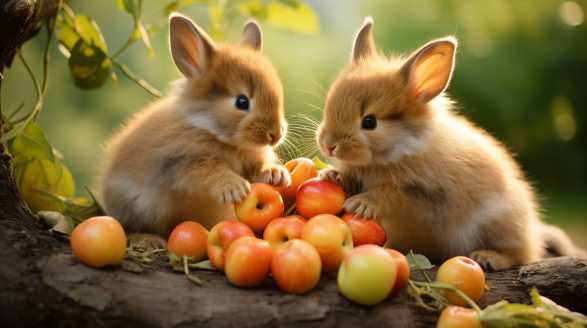
As a rabbit enthusiast and owner, I understand the importance of providing a well-balanced diet for these adorable furry creatures. One fruit that often sparks curiosity among rabbit owners is peaches.
What are the nutritional benefits? I will look into the world of peaches and explain why they can be a nutritious addition to your rabbit’s diet.
Are Peaches Safe for Rabbits?
Yes, absolutely! Rabbits can enjoy the juicy and delicious taste of peaches without any worries. However, as with any new food, it’s important to introduce peaches gradually to your bunny’s diet. Start with small amounts and observe how your rabbit reacts. If there are no adverse effects, you can increase the quantity over time.
Nutritional Benefits of Peaches for Rabbits
Peaches offer various nutritional benefits that can contribute to your rabbit’s overall health and well-being. Here’s a breakdown of the key nutrients found in peaches:
1. Vitamin C
Peaches are a great source of vitamin C, which is essential for rabbits as they cannot synthesize this vitamin on their own. Vitamin C plays a crucial role in maintaining a healthy immune system and promoting collagen production.
2. Fiber
Fiber is an essential component of a rabbit’s diet, as it aids in maintaining a healthy digestive system. Peaches provide a good amount of dietary fiber, which helps prevent gastrointestinal issues such as constipation and bloating.
3. Antioxidants
Peaches are rich in antioxidants, including beta-carotene and vitamin E. These antioxidants help protect rabbits from cellular damage, strengthen their immune system, and promote healthy aging. By incorporating peaches into your rabbit’s diet, you’re providing a natural way to boost their antioxidant intake.
4. Hydration
Not only do peaches provide essential nutrients, but they also offer hydration. Rabbits can quickly become dehydrated, especially during the summer months.
Providing a juicy peach slice can be a refreshing treat for your rabbit on a hot day.
Precautions and Potential Risks
While peaches are generally safe for rabbits, there are a few precautions to bear in mind:
1. Pit and Seeds
Always remove the pit and seeds from peaches before feeding them to your rabbit. The pit can pose a choking hazard, and the seeds contain trace amounts of cyanide, which can be harmful.
2. Allergies
Just like humans, rabbits can have allergies too. When introducing peaches for the first time, monitor your rabbit for any signs of allergies, including itching, swelling, or respiratory issues.
Peaches in Moderation: Understanding the Right Serving Size for Rabbits
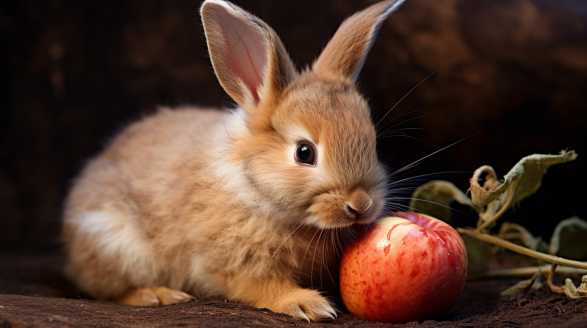
As a devoted pet parent to my adorable bunny companion, I am constantly seeking ways to provide nutritious and delightful treats. One such tantalizing option that rabbits enjoy is peaches!
we will explore the importance of feeding peaches in moderation and unveil the perfect portions to keep our rabbits both satisfied and healthy.
The Nutritional Sweetness within Peaches
Peaches are not only scrumptious but also packed with a range of essential nutrients. Rich in vitamins A, C, and K, peaches offer potent antioxidants that support the immune system and may even protect against certain diseases.
However, it’s important to remember that too much of a good thing can lead to undesirable consequences. Excessive peach consumption can disrupt your bunny’s sensitive digestive system and cause intestinal distress or diarrhea.
Optimal Serving Size: A Glimpse into the Peachy Portion
To ensure our beloved rabbits receive just the right amount of peachy goodness, it is essential to adhere to the recommended serving size. The ideal serving size for adult rabbits is approximately 1 tablespoon of fresh, mashed peaches per day.
Remember, moderation is key! Exceeding the suggested serving size may lead to digestive complications, undermining the intention of providing a wholesome treat.
Preparing Peaches for Your Bunny’s Delight
- Selecting the Perfectly Ripe Peaches:
- Look for firm yet slightly soft peaches.
- Avoid overly ripe or moldy peaches.
- Opt for organic peaches to minimize exposure to pesticides.
- Washing and Preparing the Peaches:
- Gently rinse peaches to remove any dirt or residue.
- Remove the pit to prevent a choking hazard.
- Slice or mash the peach into suitable portions.
- Caution: Beware of Pesticides:
- Peaches are part of the “dirty dozen” fruits known for higher pesticide presence.
- Consider washing the peaches thoroughly or purchasing organic options.
- Peel the skin, as it often contains the highest concentration of pesticides.
Serving Peaches: The Bunny Delight Ritual
Time It Right: A Peachy Treat as an Occasional Delight
While peaches can surely be a delightful snack for rabbits, they should not become a staple part of their diet. Introduce peaches into your bunny’s diet as an occasional treat, rather than a daily occurrence.
Pay Attention to Individual Reactions
Each bunny is unique, and their digestive systems may differ too. Observe how your rabbit reacts to peach treats, especially during the first few servings.
Alternatives to Peaches: Diversifying the Rabbit Treat Menu
Although peaches offer a delectable option, it’s always beneficial to broaden your rabbit’s palate with alternative treats. Here are a few ideas to keep your furry friend excited and their taste buds tantalized:
- Fresh Leafy Greens:
- Basil
- Parsley
- Mint
- Romaine lettuce
- Crunchy Veggies:
- Carrots
- Bell peppers
- Zucchini slices
- Delicious Berries:
- Strawberries
- Blueberries
- Blackberries
Remember to experiment with various treats and monitor your rabbit’s reaction to ensure maximum satisfaction and well-being!
In summary, peaches can be a delightful and nutritious treat for your beloved bunny companion. As responsible pet parents, it is crucial to understand the proper serving size to avoid potential digestive issues.
Embrace the diversity of treats available, ensuring your furry friend’s happiness while keeping their health at the forefront. By offering peaches in moderation and observing your rabbit’s specific needs, you can create a well-rounded diet that supports their overall well-being, fostering a lifetime of love and joy together.
Conclusion
Wow, what a peachy adventure we’ve embarked on together! Who would have thought that peaches and rabbits could have such an extraordinary connection?
I must admit, I was a bit skeptical at first, but as we dived deeper into the world of peaches and their impact on rabbits, I couldn’t help but be amazed. The intricate balance between providing essential nutrients and maintaining moderation in serving size has truly enlightened me on the importance of responsible treat-giving.
As I sit here with my bunny companion by my side, I can’t help but smile at the thought of surprising them with a juicy slice of peach. I now have the knowledge and understanding to offer this delightful treat in a safe and controlled manner, knowing that I am contributing to their overall health and happiness.
But the peachy journey doesn’t end here! I encourage you to continue exploring the vast world of treats, flavors, and textures for your furry friend.
Every rabbit is unique, and it’s through observation and attention to their individual needs that we can truly ensure their well-being.
So, my fellow rabbit lovers, let’s embrace the wonders of peaches and all the incredible benefits they can bring to our furry companions. With proper knowledge, careful introduction, and a sprinkle of love, we can truly create a joyful and satisfying treat experience for our bunnies.
As we bid farewell to this peachy extravaganza, I want to thank you for joining me on this incredible journey. Together, we’ve uncovered the secrets behind peaches and their role in supporting our rabbit’s immune system, dental health, digestion, hydration, and so much more.
Happy hopping, my friends!
Frequently Asked Questions
Can rabbits eat peaches?
Yes, rabbits can eat peaches in moderation. However, it is important to remove the pit and any leaves or stems before feeding them to your rabbit.
Are peaches safe for rabbits?
Yes, peaches are generally safe for rabbits, but they should be given as an occasional treat and not as a staple part of their diet.
Can rabbits eat peach skin?
While rabbits can eat peach skin, it is recommended to remove the skin before feeding them to your rabbit. The skin can be difficult for them to digest and may cause digestive issues.
Can rabbits eat peach pits?
No, rabbits should not eat peach pits as they are toxic to them. The pits contain cyanide, which can be harmful and potentially fatal for rabbits if ingested.
How often can rabbits eat peaches?
Rabbits should only eat peaches as a treat and not on a daily basis. It is best to offer them small amounts of peaches once or twice a week.
What are the benefits of feeding peaches to rabbits?
Peaches are a good source of dietary fiber, vitamins A and C, as well as potassium. However, these nutrients should be obtained from a balanced rabbit diet and not solely from peaches.
What are the risks of feeding peaches to rabbits?
Feeding too many peaches to rabbits can cause digestive issues such as diarrhea or upset stomach. Additionally, the high sugar content of peaches can lead to obesity and dental problems if consumed in excess.
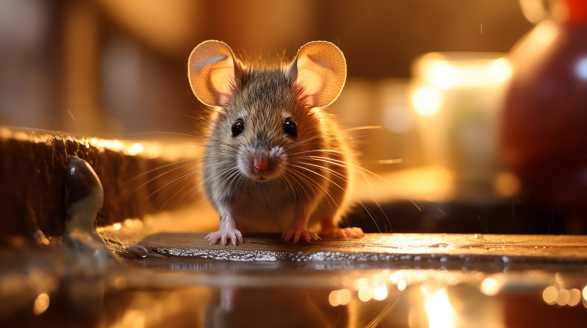
Do Rabbits Eat Mice
Introduction Do Rabbits eat mice? find out in this comprehensive guide. You know those questions that simmer in your brain when you’re wide awake at 2 a.m.? Well, this particular curiosity about rabbits and mice has been plaguing me for weeks. So, I decided to embark on a quest to uncover the truth behind this […]
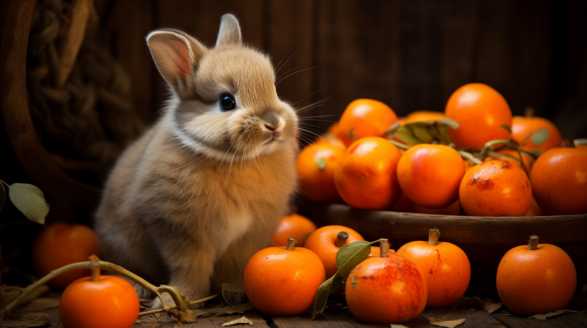
Can Rabbits Eat Persimmon
Introduction Hey there, fellow rabbit enthusiasts! If you’re like me, you’re always on the lookout for new information to keep your fluffy friend happy and healthy. Have you ever wondered if persimmons are a suitable treat for your bunny? Well,! First things first, let’s talk about what persimmons actually are. These vibrant orange fruits are […]
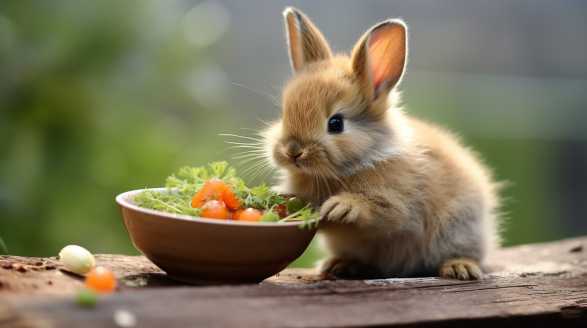
What Can Rabbits Not Eat
Introduction What can rabbits not eat? Have I got a tale to tell you today that will leave you on the edge of your seat! But little did I know that something as innocent as feeding rhubarb to my precious bunny could have such deadly consequences! Buckle up, my friends, because we’re about to dive […]
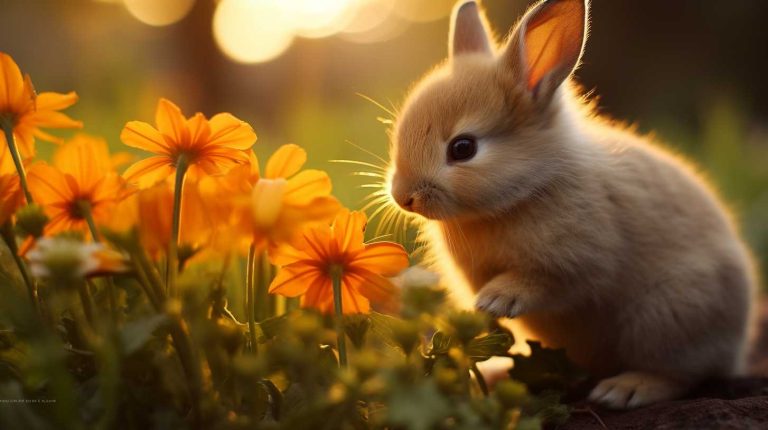
Can Rabbits Eat Daylilies
Introduction Hey there, fellow gardeners and rabbit lovers! Are you a fan of daylilies like me? But here’s the catch – rabbits seem to have a bit too much love for these beautiful flowers. As a passionate gardener, I’ve had my fair share of battles with those adorable yet mischievous creatures in an attempt to […]
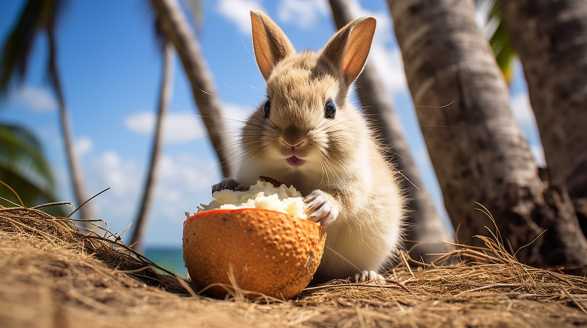
Can Rabbits Eat Coconut
Introduction Hey there, fellow rabbit enthusiasts! As someone who’s always on the lookout for ways to keep our fluffy little friends happy and healthy, the topic of coconut and its impact on rabbits has me bouncing with excitement! Imagine this: you’re cuddling with your bunny, giving them endless belly rubs, and suddenly, the thought pops […]
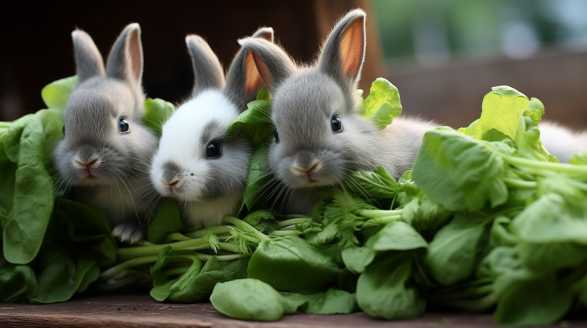
Can Rabbits Eat Spinach
Introduction Can Rabbits eat spinach? Let’s find out. Picture this: You’re peacefully cuddling your fluffy companion, munching on some delicious spinach, when suddenly it hits you—the realization that not all is well in the rabbit kingdom! I know, I know, it sounds unbelievable! Here I was, thinking that spinach was the epitome of health for […]

